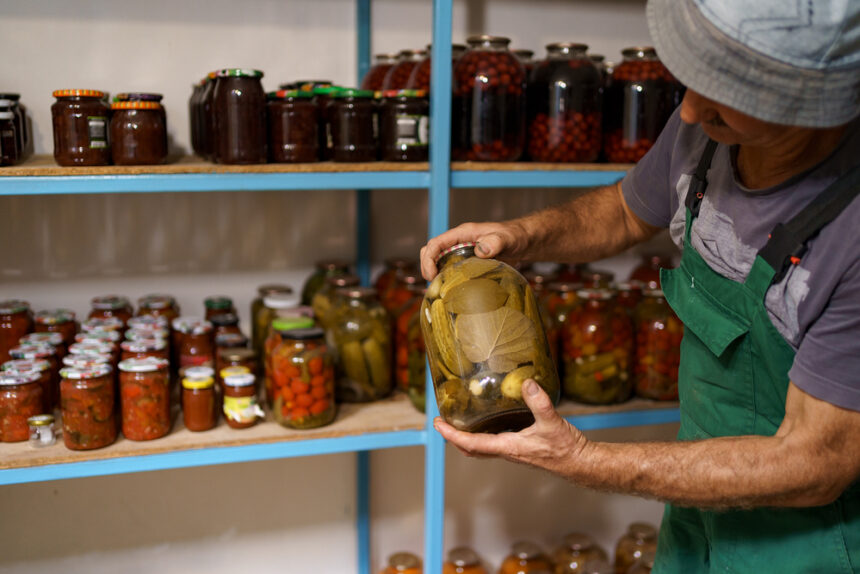Fermented meals and drinks aren’t solely wealthy in distinctive flavors but additionally filled with well being advantages. From enhancing digestion to boosting immunity, these probiotic-rich meals can play a key position in enhancing your well-being. Whether or not you’re seeking to help intestine well being or uncover new flavors, incorporating fermented choices into your food plan can provide shocking advantages. Discover a number of the most uncommon fermented meals and drinks that present highly effective health-boosting properties.
This put up might include affiliate hyperlinks, which helps preserve this content material free. Please learn our disclosure for more information.
Natto (Japan)
Natto is a standard Japanese meals made out of fermented soybeans. What makes it uncommon is its robust scent, sticky texture, and stringy look. Regardless of its polarizing style, natto is filled with vitamins like vitamin K2, which helps bone and cardiovascular well being.
One of the vital exceptional compounds in natto is nattokinase, an enzyme proven to assist cut back blood clots and help coronary heart well being. Natto additionally comprises probiotics that enhance digestion and assist restore intestine flora, making it useful for immune operate and nutrient absorption.
Chicha (Andean Area)
Chicha is a standard fermented drink made out of corn, typically related to Peru and Bolivia. In some indigenous preparations, the corn is chewed after which fermented utilizing pure enzymes from saliva. This might sound unusual, however the result’s a mildly alcoholic beverage wealthy in pure probiotics.
Chicha offers a mix of useful microbes and pre-digested starches, supporting intestine well being and selling nutrient bioavailability. It additionally comprises B nutritional vitamins and antioxidants derived from the corn, providing metabolic and immune help.
Tempeh (Indonesia)
Tempeh is a standard Indonesian fermented meals made out of soybeans. Not like tofu, tempeh is a stable block with a agency texture, which is the results of the fermentation course of. The soybeans are fermented with Rhizopus mould, which binds them right into a dense cake.
Tempeh is a wealthy supply of plant-based protein, making it an important meat substitute for vegetarians and vegans. The fermentation course of additionally makes it simpler to digest and will increase its nutrient bioavailability. Moreover, tempeh comprises useful probiotics that may enhance intestine well being and help digestion. Its excessive fiber content material additionally helps regulate blood sugar ranges and should contribute to coronary heart well being by lowering ldl cholesterol.
Pulque (Mexico)
Pulque is a standard Mexican drink made out of the fermented sap of the agave plant. Not like tequila or mezcal, pulque is thick and barely bitter with a low alcohol content material. It has been consumed since pre-Hispanic instances.
Pulque comprises prebiotics like inulin and useful lactic acid micro organism. These help a wholesome digestive tract and should enhance nutrient absorption. It additionally comprises small quantities of amino acids and nutritional vitamins, making it a useful drink with historic roots in wellness.
Hakarl (Iceland)
Hákarl is a fermented shark meat dish from Iceland. It’s buried underground and left to ferment for a number of months. Although it has a powerful ammonia-rich aroma and is an acquired style, hakarl is extremely valued in Icelandic custom.
The fermentation course of neutralizes toxins naturally current in Greenland shark meat, making it secure to eat. It offers a supply of lean protein, omega-3 fatty acids, and compounds that help mind well being and anti inflammatory responses.
Poi (Hawaii)
Poi is a staple meals in Hawaiian delicacies made out of fermented taro root. It has a easy, paste-like consistency and a barely bitter taste that develops because it ferments. Poi is of course hypoallergenic and simple to digest.
This fermented dish comprises lactic acid micro organism that help intestine microbiota. It’s wealthy in potassium, magnesium, and sophisticated carbohydrates, providing sustained vitality and selling coronary heart and muscle operate. Its soothing texture makes it very best for individuals with delicate stomachs.
Pla ra (Thailand)
Pla ra is a fermented fish paste utilized in Thai delicacies. Made by fermenting freshwater fish with rice bran and salt, it has a powerful, pungent aroma however is liked for its daring umami taste.
Fermentation breaks down proteins into amino acids and enhances the dietary profile. Pla ra introduces useful enzymes and probiotics that support digestion, whereas additionally providing minerals similar to calcium and phosphorus from the fish bones.
Tibicos (Water Kefir Grains)
Tibicos are small, translucent crystals used to ferment sugary liquids right into a probiotic drink referred to as water kefir. These grains are totally different from dairy kefir and are excellent for vegan or lactose-intolerant people.
Water kefir is wealthy in probiotic strains like Lactobacillus and Bifidobacterium, which help digestive well being, increase immunity, and should cut back irritation. It’s also a refreshing different to sugary sodas whereas delivering gut-friendly microbes.
Miso (Japan)
Miso is a Japanese fermented paste sometimes made out of soybeans, rice, or barley. It’s fermented with a kind of fungus known as Aspergillus oryzae, which helps break down the grains right into a savory, umami-rich paste. Miso is a key ingredient in lots of Japanese dishes, together with miso soup.
The fermentation course of will increase the bioavailability of vitamins, permitting for simpler digestion and absorption of protein, nutritional vitamins, and minerals. Miso can also be recognized for its probiotic content material, which may help intestine well being by sustaining a wholesome steadiness of excellent micro organism within the digestive system. Moreover, it comprises antioxidants which will assist shield in opposition to oxidative stress and irritation, supporting total immune operate.
Kumis (Central Asia)
Kumis is a fermented dairy drink made out of mare’s milk, consumed in components of Mongolia and Kazakhstan. It’s barely alcoholic and comprises pure effervescence from fermentation.
Kumis offers useful probiotics and enzymes that enhance lactose digestion. It’s also wealthy in protein, vitamin C, and different micronutrients typically lacking from commonplace dairy merchandise, making it a nourishing beverage in nomadic cultures.
Kimchi (Korea)
Kimchi is a widely known Korean dish made out of fermented greens, sometimes napa cabbage and radishes, blended with seasonings like chili, garlic, ginger, and fish sauce. It is among the hottest fermented meals in Korea, typically served as a aspect dish with almost each meal.
Kimchi is filled with probiotics, that are useful for intestine well being and might improve digestion. The fermentation course of additionally preserves the nutritional vitamins and minerals within the greens, making them extra simply absorbed by the physique. Moreover, kimchi comprises antioxidants and anti inflammatory compounds which will assist cut back the chance of continual ailments, similar to coronary heart illness and most cancers. Its wealthy content material of fiber and low calorie depend additionally makes it useful for weight administration.
.
Boza (Balkans and Turkey)
Boza is a standard fermented drink made out of millet, corn, or wheat. It has a thick, barely gritty texture and a sweet-sour style, with low alcohol content material.
Boza is wealthy in B nutritional vitamins, iron, and naturally occurring probiotics. It helps intestine well being, vitality metabolism, and immune operate. Due to its gentle fermentation, it’s also appropriate for youngsters and aged individuals.
Fermented Cassava (West Africa)
Fermented cassava is a staple in West African delicacies and is used to make dishes like gari, fufu, or agbelima. The fermentation course of removes pure toxins current in uncooked cassava.
It offers secure, starchy vitality together with probiotic micro organism. Fermentation additionally will increase the supply of micronutrients like magnesium and zinc whereas enhancing digestibility, making it a significant meals supply in areas with restricted meals range.
This text initially appeared on Avocadu.












